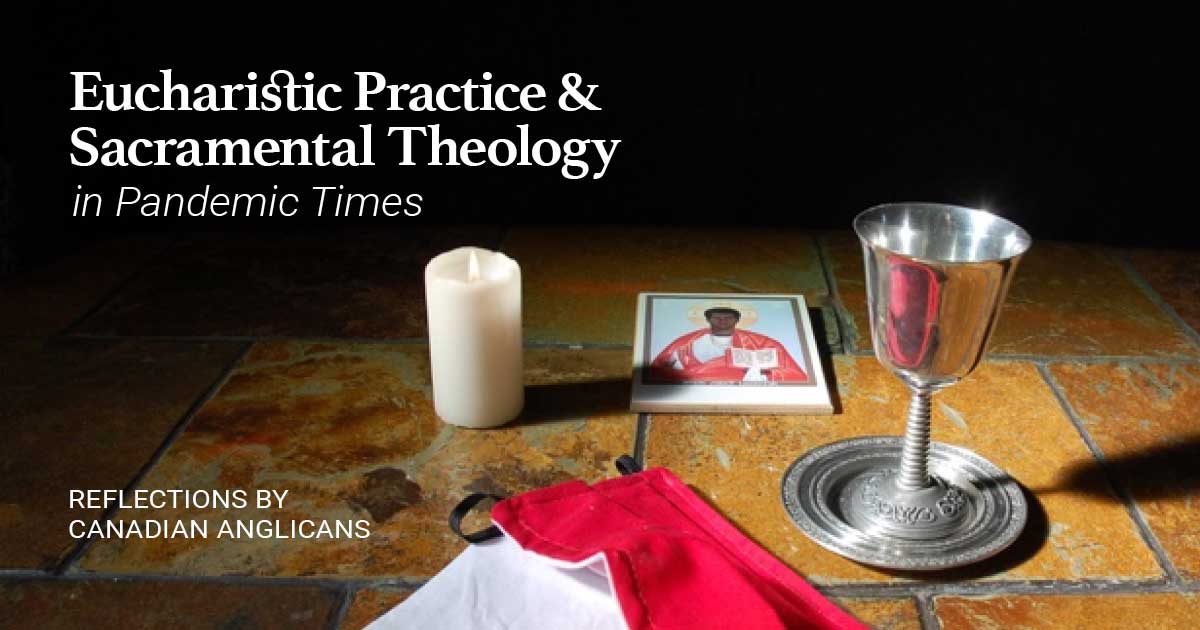
When pandemic-related public health measures necessitated the closure of Canadian places of worship in early 2020, parish leaders entered into a flurry of activity to tend to difficult and immediate pastoral needs, and to reshape the worshipping and gathering life of their communities. For many, the loss of the capacity to celebrate the eucharist struck hard and the grief that ensued was tough.
A growing number of voices began to advocate for permission to adapt Holy Communion for remote or distanced safe practice, and debates sprang up about the nature of words such as real, virtual, presence and communion.
In response to the emerging discourse and in an effort to facilitate conversation, the Faith, Worship, and Ministry committee of General Synod invited submissions of theological reflections on eucharistic practice and sacramental theology. Over forty submissions were received, which have been collected, edited and organized into this resource, for study and discussion.
In this resource
The essays in this collection vary in their approach, voice, focus questions and contexts of origin. All are of a theological nature, though their approaches to the doing of theology differ. All exhibit, in some way, the Anglican ethos that seeks to integrate pastoral, liturgical and theological concerns together. Essays have been sorted into the following categories:
- Spiritual Roots for Stressful Times
- Learning in Context: Congregational Life and Mission
- Discipleship and Mission
- Theological Foundations and Journeys
- Reflections from Ecumenical and Anglican Communion Partners
- Epilogue: A Theology of Lament and Hope
Contributors
Honourifics/titles current as at time of print publication (2021).
- The Ven. Kyn Barker
- Dr. Patricia Bays
- The Rev. Dr. Stephen Black
- The Rev. Dr. Hilary Bogert-Winkler
- The Rev. Daniel Bowyer
- The Rev. Dr. Chris Brittain
- The Rt. Rev. Dr. Terry M. Brown
- The Rt. Rev. William Cliff
- The Most Rev. David Edwards
- The Rev. James W. Farwell
- Leslie Flynn
- The Rev. Canon Nancy Ford
- The Most Rev. Anne Germond
- The Rev. Dr. Rebecca Graham
- Canon John Hill
- PJ Hobbs
- The Rev. Canon Paul Jennings
- The Rev. Canon Donna Joy
- The Rev. Dr. Alison Kemper
- The Most Rev. Gregory Kerr-Wilson
- Brother James Koester SSJE
- The Ven. Richard Geoffrey Leggett
- The Rev. Barbara Liotscos
- The Rev. Stephen London
- The Rev. Dr. Iain Luke
- The Rev. Dr. Joanne Mercer
- The Rev. Dr. Deborah Meister
- The Rev. Dr. Ruth Meyers
- Dr. Brendon Neilson
- The Rev. Juan M.C. Oliver
- The Rev. Dr. Andy O’Neill
- The Rev. Canon Nick Pang
- The Rev. Anne Privett
- Queen’s Theological College (led by Rev. Canon Dr. David Bell and Canon John Courage)
- The Rev. Grant Rodgers
- The Ven. Christine Ross
- The Rev. Dr. Eileen Scully
- The Rev. Canon Dr. Scott Sharman
- The Rev. Canon Dr. Murray Still
- The Rev. Marie-Louise Ternier
- The Rev. Canon Dr. Phillip Tovey
- The Rev. Canon Lisa G. Vaughn
- Alexa Wallace
- The Rev. Brandon Witwer


